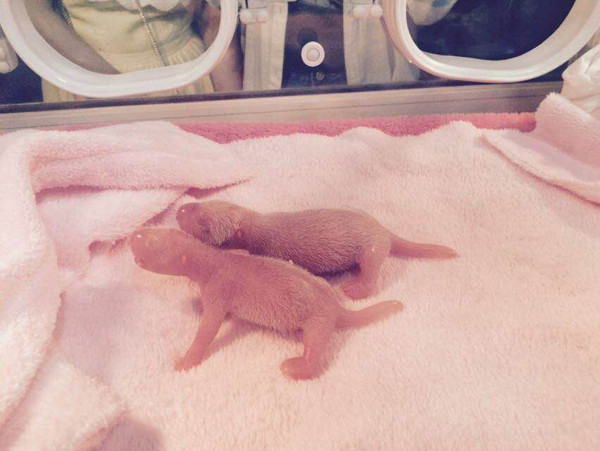China: Twin baby pandas born after mother artificially inseminated

In a bid to increase the diminishing panda population, twin baby pandas were born in China after their mother was artificially inseminated.
The panda sisters, the first set of twin pandas in 2015, are in good condition, according to the chief administrator, Wu Kongju who said the twins had normal body temperature and milk consumption.
The newborn pandas, just a year old, were showcased to the public on 23 June at a breeding centre in the south western city of Chengdu.
Still hairless, the pandas had their eyes shut and exuded a bright pink colour.
Just some baby twin pandas snuggling http://t.co/v5C2M7Zu5b pic.twitter.com/ucZVtT0IU5
— Lizzie Dearden (@lizziedearden) June 24, 2015The pandas were born weighing 118g and 70g on 22 June after their seven-year-old mother Kelin was artificially inseminated in January.
A product of the Chengdu Research Base of Giant Panda Breeding, the pandas will eventually be left in the wild to breed naturally after their initial development is carefully monitored.
Earlier, scientists in China discovered the giant pandas' gut bacteria is unable fully to digest the bamboo plant.
"Unlike other plant-eating animals that have successfully evolved anatomically specialised digestive systems to effectively deconstruct fibrous plant matter, the giant panda still retains a gastrointestinal tract typical of carnivores," said Dr. Zhihe Zhang, from the Chengdu Research Base of Giant Panda Breeding in China.
"This combined scenario may have increased their risk of extinction.
"[The findings] may adversely influence the co-evolutionary fitness of this herbivore."
The latest success comes as scientists try and boost the population of pandas.
Pandas are presently suffering due to a habitat loss with their natural habit being the mountains in south western China.
Their low reproductive rate adds to the risk of their extinction and with less than 2,500 pandas left in the wild, the animals have made it to red list of threatened species on the IUCN's (International Union for Conservation of Nature).
© Copyright IBTimes 2025. All rights reserved.























